The EU does not need a reset of its relations with Russia
Adelina Marini, June 2, 2010
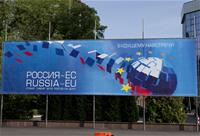 The EU and Russia have always had serious frictions on numerous issues but there was a sense of optimism and partnership at their regular summit in Rostov-on-Don. A reason for this sense was the start, on June 1st, of the initiative "Partnership for Modernisation". If before the European Union fretted seriously at Russia's opportunity to invest freely in EU's economy without responding equally, now with this initiative things are to change significantly.
The EU and Russia have always had serious frictions on numerous issues but there was a sense of optimism and partnership at their regular summit in Rostov-on-Don. A reason for this sense was the start, on June 1st, of the initiative "Partnership for Modernisation". If before the European Union fretted seriously at Russia's opportunity to invest freely in EU's economy without responding equally, now with this initiative things are to change significantly.
It is a result of the realization that citizens and economies become more and more interconnected and interdependent as well as that it is getting more and more important economies and societies to modernize. And if until recently, as the initiative points out, Russia and the EU have been strategic partners in a changing multipolar world with the main task to find responses to the common challenges on the basis of democracy and rule of law, the new agreement has the same goals.
The difference is that the Partnership for Modernization will serve as a framework 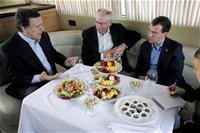 for reforms, economic growth and enhancing competitiveness. The main mechanism for the implementation of the initiative will be a dialogue on a "field" level. Agreement's priority areas include: broadening of the possibilities for investments in key fields, stimulating growth and innovation, increasing and deepening of bilateral trade and economic cooperation and also creation of better conditions for small and medium sized enterprises. There will be a focus also on uniforming regulations and standards and also intellectual property protection.
for reforms, economic growth and enhancing competitiveness. The main mechanism for the implementation of the initiative will be a dialogue on a "field" level. Agreement's priority areas include: broadening of the possibilities for investments in key fields, stimulating growth and innovation, increasing and deepening of bilateral trade and economic cooperation and also creation of better conditions for small and medium sized enterprises. There will be a focus also on uniforming regulations and standards and also intellectual property protection.
The initiative will also cover transport, development of sustainable low-carbon economy, energy efficiency, innovation. Cooperation is foreseen also in the field of cosmic research. Reforms in the field of justice and home affairs, fighting the corruption and dialogue with civil society and business have not been omitted from the Partnership as well.
The implementation of the Partnership for Modernization will be under constant monitoring and there will also be an exchange of opinions within the Russia-EU dialogue on all possible levels.
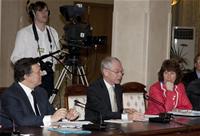 As part of the new partnership is also the discussion about visa free travel in the EU for Russian citizens. In fact, the press conference of the Russian president Dmitry Medvedev, the president of the European Council Herman van Rompuy and the president of the European Commission Jose Manuel Barroso left the impression that the two sides understand very well what the obstacles for the deepening of Russian-European relations are, especially with regard to visa free travel.
As part of the new partnership is also the discussion about visa free travel in the EU for Russian citizens. In fact, the press conference of the Russian president Dmitry Medvedev, the president of the European Council Herman van Rompuy and the president of the European Commission Jose Manuel Barroso left the impression that the two sides understand very well what the obstacles for the deepening of Russian-European relations are, especially with regard to visa free travel.
On his part president Medvedev explained that technically and politically Russia was ready to remove visas for EU citizens as of tomorrow because Russia was a single country. But he said that it could not be expected Europe to react that quickly because it was a Union of 27 member states, some of which had their objections against the removal of the visas for Russians. Mr Medvedev refused to name those countries but called for the non-politisation of this issue.
He only said that their objections were a result of historical accumulations rather than security concerns. Russia gave its European guests a draft agreement for visa free travel but from the words of the Russian president it became clear that Russia was ready to wait as long as it would take for a consensus to be reached on a European level. And on this issue Russia did not betray its style by saying that it did not want to interfere in the internal affairs of the Union but if there was consent it was ready to take a bilateral approach to try and solve the visa issue.
According to Herman van Rompuy, the contacts between the Russian and 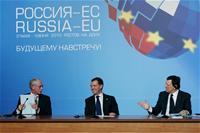 European businesses, students, professors and others would enhance enormously the modernization. He refused to take any specific commitments by concluding: "We therefore remain committed to making concrete progress, as soon as possible, on the ground".
European businesses, students, professors and others would enhance enormously the modernization. He refused to take any specific commitments by concluding: "We therefore remain committed to making concrete progress, as soon as possible, on the ground".
There was a remarkable synchronous on other topics as well, which the three leaders touched vaguely - the financial crisis and regulation, Iran, Afghanistan, the Middle East. This harmony resulted in a joint statement by the Russian foreign minister Sergey Lavrov and the High Representative for External Affairs baroness Catherine Ashton on Monday's Israeli assault on a humanitarian convoy in international waters. Both Russia and the EU called for an independent and transparent inquiry of the case as well as for immediate lift of the Gaza blockade.
And with regard to financial regulation, the Russian side expressed understanding and support for EU's plans for a common global financial regulation, In the same time Dmitry Medvedev used the situation to remind the US that unilateral actions in such a delicate field were counterproductive. Against the background of EU's unconditional support for Russia's membership to the World Trade Organisation (WTO), Medvedev expressed bewilderment that it was possible for countries that lag for decades behind Russia in their development but were accepted as WTO members while there were obstacles for Russia. He refused to name specific countries but stressed that Russia was the only G20 country that was not a member of the WTO. And added that unless this happened Moscow would continue to work with different standards.
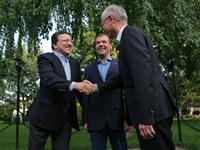 And if so far the summit climate would seem quite warm to you, there was a bit of a lowering of the temperatures. It came from president Herman van Rompuy who started with a good assessment of the recent legislative changes in Russia (the ratification of Protocol 14 of the European Human Rights Convention, the expansion of jury trials nationwide, and the confirmation of the moratorium on the death penalty). Nevertheless, however, Mr Van Rompuy stressed that the situation for human rights defenders and journalists in Russia was still of great concern to the European public at large. Another matter of concern was climate of impunity, in particular in Chechnya and other areas of the North Caucasus.
And if so far the summit climate would seem quite warm to you, there was a bit of a lowering of the temperatures. It came from president Herman van Rompuy who started with a good assessment of the recent legislative changes in Russia (the ratification of Protocol 14 of the European Human Rights Convention, the expansion of jury trials nationwide, and the confirmation of the moratorium on the death penalty). Nevertheless, however, Mr Van Rompuy stressed that the situation for human rights defenders and journalists in Russia was still of great concern to the European public at large. Another matter of concern was climate of impunity, in particular in Chechnya and other areas of the North Caucasus.
As could be expected, these remarks remained unanswered, at least at the joint press conference, which allowed only 4 questions - 2 for each side.
Against the backdrop of the overall "soft" change in geopolitical proportions, there was one remark by Herman van Rompuy which was quite impressive and would probably be interpreted a lot after the summit. In the end of his statement he 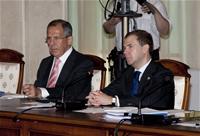 concluded: "Russia is a real strategic partner to the EU. With you we have a most intensive and dynamic dialogue. With Russia we do not need a "reset". We want a "fast forward"."
concluded: "Russia is a real strategic partner to the EU. With you we have a most intensive and dynamic dialogue. With Russia we do not need a "reset". We want a "fast forward"."
Probably these words are a reference to president Obama's administration's vision of the relations between Russia and the US, which have been restarted (reset). And in a combination with a fast forward, it is possible that Herman van Rompuy had in mind that maybe the EU and Russia were no longer hostile neighbours and should quickly make up for what has been missed so far.
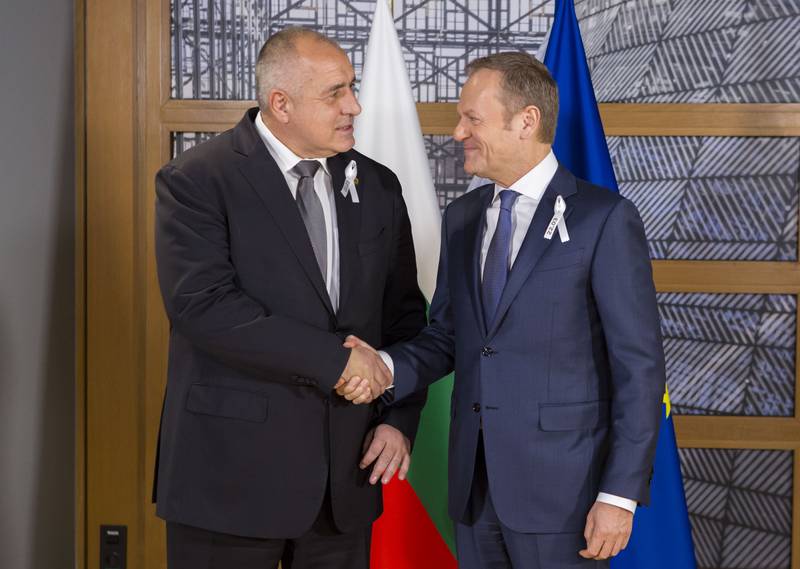 Boyko Borissov, Donald Tusk | © Council of the EU
Boyko Borissov, Donald Tusk | © Council of the EU Boris Johnson | © Council of the EU
Boris Johnson | © Council of the EU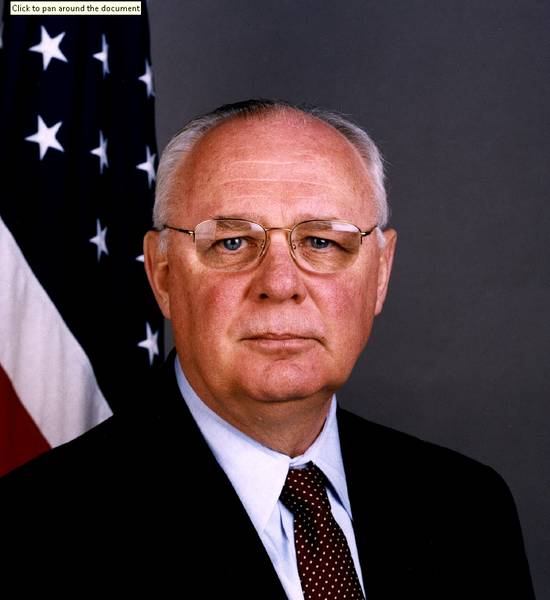 James W. Pardew | ©
James W. Pardew | ©